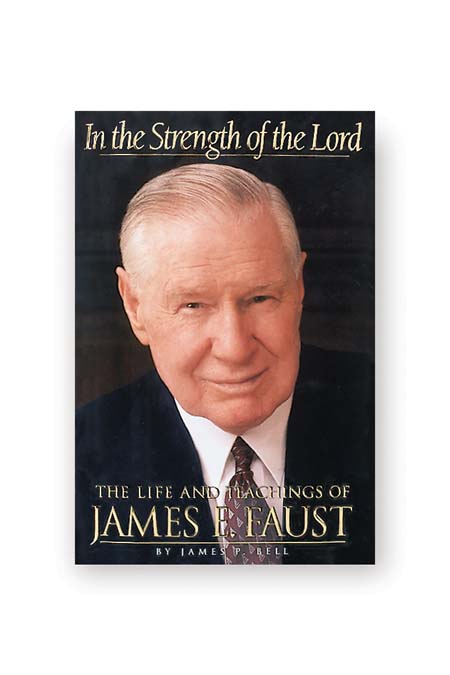By Erlend D. Peterson
In section 58 of the Doctrine and Covenants, the Lord tells us that it should not be necessary for him to “command in all things.” He then says, “Men should be anxiously engaged in a good cause, and do many things of their own free will, and bring to pass much righteousness; For the power is in them, wherein they are agents unto themselves” (D&C 58:2628).
The principle that we should be “anxiously engaged in a good cause” has been reaffirmed often by modern prophets. President Ezra Taft Benson provided this insight:
Usually the Lord gives us the overall objectives to be accomplished and some guidelines to follow, but he expects us to work out most of the details and methods. The methods and procedures are usually developed through study and prayer and by living so that we can obtain and follow the promptings of the Spirit. Less spiritually advanced people, such as those in the days of Moses, had to be commanded in many things. Today those spiritually alert look at the objectives, check the guidelines laid down by the Lord and his prophets, and then prayerfully act–without having to be commanded “in all things.” . . .
Sometimes the Lord hopefully waits on his children to act on their own, and when they do not, they lose the greater prize, and the Lord will either drop the entire matter and let them suffer the consequences or else he will have to spell it out in greater detail. Usually, I fear, the more he has to spell it out, the smaller is our reward. [Conference Report, April 1965, pp. 12122]
As BYU’s dean of Admissions and Records, I am deeply committed to this principle. I feel a sacred trust and responsibility for seeking and admitting students who will not only be serious about their education, but will also use their education and talents to build and serve the kingdom of God.
Leaders of the Church and BYU over the years have often expressed great hope and faith in the potential of BYU graduates. One of my favorite such statements was given by President Spencer W. Kimball:
I am both hopeful and expectant that out of this university …there will rise brilliant stars in drama, literature, music, sculpture, painting, science, and in all the scholarly graces. This university can be the refining host for many such individuals who will touch men and women the world over long after they have left this campus. [Spencer W. Kimball, “Second Century Address and Dedication of Carillon Tower and Bells,” BYU, Oct. 10,1975, p.4]
In 1988, during an executive committee meeting of the board of trustees, President Gordon B. Hinckley made a similar statement: “The mission of BYU is to produce men and women who will make a significant contribution to society and in the process render faithful service to the Church and also be a strong influence for the Church in the world” (Ford Stevenson, personal file note).
In recent years it has become apparent that there are far more students desiring to participate in this unique educational experience than BYU can accommodate. In a 1990 BYU fireside, Elder Boyd K. Packer addressed this issue and declared, “Entrance requirements cannot be based on grades alone. Church schools are not solely for the academically gifted” (Boyd K. Packer, “The Edge of the Light,” BYU Today 45, no. 2 [March 1991], p. 39).
That same year, 1990, I was appointed dean of Admissions and Records, and we were given a charge by the board of trustees to expand the criteria by which students are admitted to BYU. As we prayerfully considered our task, we frequently referred to President Hinckley’s comment that BYU graduates should “make a significant contribution to society” and “be a strong influence for the Church in the world.” We decided that an applicant’s service and leadership in community, high school, and church should weigh significantly in the balance, and in 1991 the undergraduate admissions application was expanded to collect this information. The effects of that change are interesting to note: Approximately 25 percent of the current freshman class would not have been admitted if only grades and test scores were used in the selection process.
Each applicant’s admission file is impressive. The applicants’ commitment to service and leadership shines. They are an extraordinary group of students. I am convinced that this institution will continue to grow in prestige largely because of the quality of its students.
Attendance at BYU is truly a sacred privilege, not only because relatively few LDS students can attend but also because of BYU’s financial support. Seventy percent of the cost of a BYU education is provided by the tithes of LDS Church members. Therefore, whether or not a student has a scholarship, the financial support by the Church is significant. The gift from, or better stated, the financial investment in students by the Church assumes an obligation on the part of each student to fulfill the purposes for which this university is chartered.
Two years ago Paul Cox, then dean of General Education and Honors, made the following statement:
BYU students who see their scholarships [and admissions] as gifts rather than as entitlements will use their time at BYU to prepare for future service in the kingdom of God. They will keep themselves pure and unspotted so that they can enter the temple and become parents of an eternal family unit. They will diligently study the scriptures and prepare themselves to teach superbly in their homes and in the auxiliaries of the Church. They will seek to hone their musical, accounting, and ad-ministrative talents to assist the Church wherever they live. They will learn to live close to the Spirit so they will be able to identify and reach out to those who are in need. Such students will be particularly cognizant of Church members in distant lands who support BYU with tithes and offerings but who cannot enroll here. They will, where appropriate, seek to study other languages and cultures so as to better prepare themselves for service in a worldwide Church. [Paul Alan Cox, “Your Scholarship: Gift or Entitlement?” Oct. 10,1995, p.8]
There have always been high expectations for BYU students, and this school has an illustrious list of graduates who have made and are seeking to, in President Hinckley’s words, make “a significant contribution to society and in the process render faithful service to the Church and also be a strong influence for the Church in the world.”
For example, there is an international student on our campus who is “anxiously engaged” in serving others. Because of her own financial difficulties, she is sensitive to others’ needs. As she has met students who are struggling to make ends meet, she has taken it upon herself to direct these students to campus offices that may have resources to help. She has also found financial sponsors for some and, in some cases, has raised money herself to give to those who are in desperate need.
A former BYU student, like many of our alumni, freely gives of his skills and talents. Upon leaving BYU he studied medicine and eventually became a plastic surgeon. He now has his own practice. Each year he and his colleagues travel to South America at their own expense and provide needed plastic surgery to children whose bodies and faces are grossly disfigured. He brings hope and healing to those who could never afford such procedures.
Recently I learned that one of my former BYU classmates has adopted the practice of giving 10 percent of his professional time in service to others without a charge, just as he gives a tithing on his income. As a student at BYU, he constantly served others through student government, service organizations, and the Church. This has continued through his life, and he has served in the BYU Alumni Association, as a bishop twice, and as a stake president.
The wonderful service of full-time homemakers should also be recognized. Every year during the scholarship-selection process, so many students, when asked what made the difference in their lives, respond that it was their parents, specifically their mothers. They tell of mothers with great talents and skills who could have had distinguished professional careers but remained in the home to nurture and teach their children. I am convinced that these good women saw their opportunity to “bring to pass much righteousness” by raising a righteous posterity to the Lord.
We are all recipients of gifts from the Lord that can be used to build the kingdom and make this world a better place in which to live. The Lord emphasized this wonderful principle through the Prophet Joseph Smith in March 1831: “To every man is given a gift by the Spirit of God” (D&C 46:11).
President Spencer W. Kimball said, “God has endowed us with talents and time, with latent abilities and with opportunities to use and develop them in his service. He therefore expects much of us, his privileged children.” (The Miracle of Forgiveness [Salt Lake City: Bookcraft, 1969], p. 100) To attend BYU is to be a privileged child. It is important that BYU students and graduates seize every opportunity to develop their talents and prepare for service. Then, as we become “anxiously engaged in a good cause,” we will “bring to pass much righteousness” and the Lord will open doors for us to make our own contributions.
This article is adapted from a devotional address given March 17, 1998, in the Marriott Center










